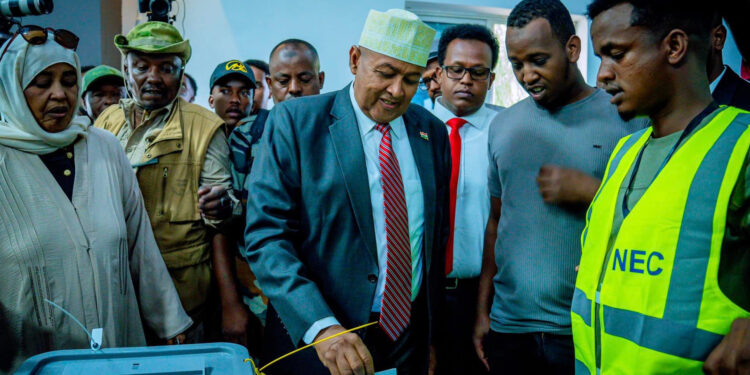HARGEISA (Somaliguardian) – Since Abdirahman Mohamed Abdullahi, popularly referred to as Irro—a seasoned diplomat and former speaker of Somaliland’s parliament—was declared the winner of the break-away area’s November 13 election, hypothesis has mounted over whether or not he’ll annul the controversial sea entry settlement signed by outgoing President Muse Bihi Abdi with Ethiopia in January.
In response to officers from the present Somaliland authorities, the settlement, which is merely a memorandum of understanding slightly than a proper deal, would require the breakaway northern Somali area to lease a tract of land alongside the Crimson Sea to Ethiopia in trade for Addis Ababa’s recognition of Somaliland as an unbiased nation.
The settlement sparked a political firestorm throughout the Horn of Africa and past, with Somalia, the de jure guardian of Somaliland however not its de facto authority, condemning it as unlawful and an infringement on its sovereignty, whereas swiftly garnering help from neighboring Djibouti, Eritrea, Egypt, and different Crimson Sea international locations.
Whereas the settlement sparked native dissent in Somaliland, notably within the Awdal area, the place the land designated for lease to Ethiopia is situated, it was largely applauded by many within the political institution, with some, together with the newly elected president, who then led Waddani opposition social gathering, expressing cautious help and refraining from absolutely endorsing or opposing it.
On the time, Abdirahman Mohamed Abdullahi asserted that the federal government had the suitable to barter agreements, and if the deal included recognition for Somaliland, it was a optimistic improvement; nevertheless, he famous conflicting stories surrounding the settlement and emphasised that it was the duty of parliament to handle and resolve the ambiguities.
In contrast to Bihi, a former navy pilot in Somalia’s military who fought with the Ethiopia-backed Somali Nationwide Motion to overthrow Siad Barre’s navy regime, Irro is a seasoned diplomat, having served as Somalia’s first consul to Moscow within the Eighties and later as ambassador to Russia.
In distinction to Bihi, who rebuffed exterior counsel on his choices, Irro is an skilled diplomat surrounded by a cadre of educated and astute advisors, well-equipped to guage each the dangers and rewards of the settlement his predecessor cast with Ethiopia.
Whereas his stance on the settlement throughout his opposition days was measured, partly to keep away from dropping in style help within the run-up to the election, because the voters was firmly in favor of recognition and rallied behind anybody they perceived as keen to champion it.
Irro is set to take decisive motion on the settlement, bringing it earlier than parliament to make clear its ambiguities and eradicate any provisions that could be perceived as opposite to the breakaway area’s pursuits, together with the 50-year land lease to Ethiopia for the development of a naval base.
For any discerning observer, no matter their background in diplomacy, politics, or regulation, it’s an inherently harmful and existentially dangerous proposition for a small, unrecognized area to cede territory to a vastly bigger neighboring nation—particularly one with a historical past of violent battle and territorial ambitions—notably when such land is designated for a naval base that would in the end function a strategic springboard for future encroachment.
For the reason that signing of the settlement, Ethiopian officers have repeatedly asserted their declare to a sovereign sea outlet to the Crimson Sea, regardless of their landlocked standing, with some even going as far as to assert possession of Somalia’s coastlines and threatening to make use of any means, together with navy drive, to realize this goal. Moreover, Ethiopian officers have since backtracked on their earlier statements concerning the popularity of Somaliland in trade for the ocean outlet lease.
Totally cognizant of Ethiopia’s shifting positions and the substantial dangers embedded within the settlement, Irro and his group now have the chance to amend it in a approach that safeguards Somaliland’s pursuits; whereas the brand new president could also be keen to grant Addis Ababa entry to the port of Berbera, together with tax exemptions for sure offloads, he’s resolute in avoiding the legacy of being the chief who permitted a hostile neighbor to militarize Somaliland’s territory, probably setting the stage for future annexation of the self-declared republic.
In issues of diplomatic, commerce, and safety cooperation with Ethiopia, Irro seems set to proceed the method of his predecessors—Mohamed Haji Ibrahim Egal, Dahir Riyale Kahin, Ahmed Mohamed Mohamud Silanyo, and Muse Bihi Abdi—who persistently portrayed Ethiopia as Somaliland’s singular ally and guarantor, selling the necessity for peaceable coexistence with their highly effective neighbor.
It stays unsure whether or not Irro will work to fix ties with Djibouti—whose financial pursuits have been undermined by the ocean entry deal Bihi signed with Ethiopia, which Djibouti seen as a menace to its port revenues—or whether or not he’ll deal with addressing the protracted disputes with Somalia’s federal authorities over Somaliland’s pursuit of independence and recognition, and Somalia’s stance on re-unification, leveraging his diplomatic acumen to interrupt the decades-long impasse, even when it requires a win-lose method.
The extra deftly Irro maneuvers via the intricate tensions of the Horn of Africa and the rising clamor of battle, the higher it is going to be for the breakaway area, which suffered its most tumultuous interval of division and strife underneath the outgoing Bihi—but solely time will inform the true influence of his management.
Contact us: data@somaliguardian.com










